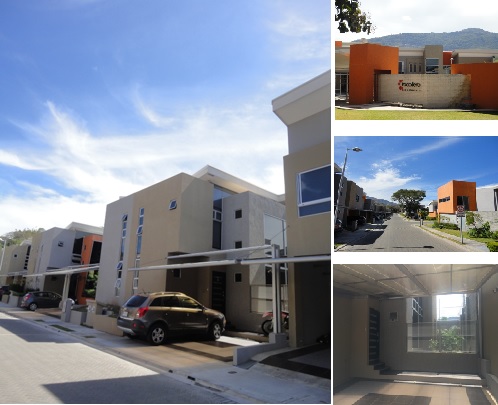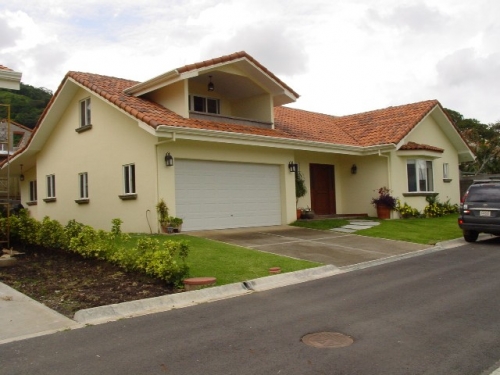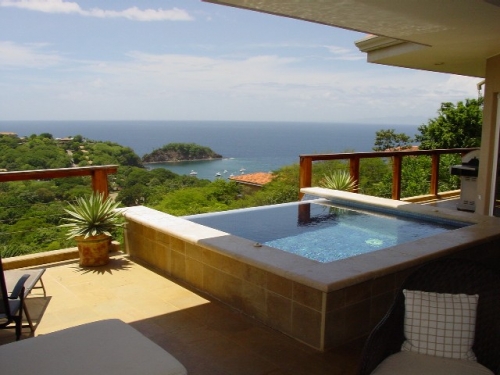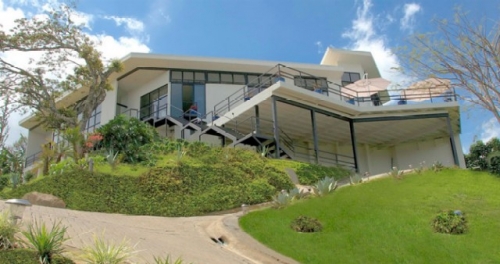Costa Rica Guide
Costa Rica Real Estate
List your property today!
Inclusion of real estate listings at Costa Rica Guide is
absolutely free of charge.
Featured Properties
Costa Rica Guide - Costa Rica Real Estate
Buying Process - Real Estate Information
Buying? Building? Here is what you need to know
By Roger Petersen, Attorney at Law
Buying property and constructing buildings or a home can be an intimidation process, even when you are at home in the culture and know what to expect and plan for. In a foreign country, the same processes can be downright frightening. In a new setting, you need to learn what the usual way to go about things is and also who is legally and ethically responsible for what-in other words your should invest some time in learning how things work and how to protect your investment.
Fortunately, in Costa Rica there is a defined process through which an intelligent buyer and builder should proceed. In addition, there is a licensing body for architects and engineers, which also sets standards for fees should you decide to build. But let's start at the beginning.
I want to purchase property in Costa Rica. What is required?
So you've found, either through a real estate agent or your own searches, a piece of property that is perfect for you. Once you have negotiated a sales price and the seller has accepted your offer, then the legal procedures for transferring ownership of title begin.
How is title transferred?
In Costa Rica, property is transferred from seller to buyer by executing a transfer deed (escritura) before a notary public. Unlike common law countries, such as the United States and Canada, where the role of the notary is limited to authenticating signatures, in Costa Rica the notary public has extensive powers to act on behalf of the state. The notary public must be an attorney and she or he may draft and interpret legal documents, as well as authenticate and certify the authenticity of documents.
In order to close on the property, the buyer and seller must select a notary/attorney who will draft the transfer deed and register the sale in the Public Registry (Registro Nacional). the local custom is that the buyer may select his or her notary/attorney to draft the transfer deed if paying cash for the property. If the purchase price is financed, there are generally three alternatives for selecting the notary/attorney.
1. If a large percentage of the purchase price is being financed by the seller and a mortgage needs to be drafted to guarantee payment, then the seller may request that her or his notary/attorney draft the transfer deed.
2. If a property is purchased 50 percent cash and 50 percent financed, it is common for the buyer's attorney and seller's attorney to jointly draft the transfer deed and mortgage in a single document. This is known as co-notariado.
3. Finally, the buyer nay insist that his or her notary/attorney draft the transfer deed and let the seller's notary/attorney draft a separate mortgage instrument. In this case, because the mortgage is being drafted separately, it carries a higher registration fee. The registration fees are discussed below in the section on closing costs.
At your option, the property can be purchased in an individual's name, jointly with other persons, or in the name of a corporation. the decision as to ownership should be based upon your particular situation and after consultation with your attorney.
How can I ensure that I have clear title to the property?
Costa Rican law requires that all documents relating to an interest and/or title to real property be registered in the property section of the Public Registry (Article 460 of the Civil Code). Most properties have a titled registration number known as the folio real, and the records database can be searched with this number or by name index. The Public Registry report (informe registral) provides detailed information on the property, including the name of the title holder, boundary lines, tax appraisal, liens, mortgages, recorded easements, and other recorded instruments that would affect title.
Since Costa Rica follows the doctrine of first in time, first in right, recorded instruments presented to the {Public Registry are given priority according to the date and time in which they are recorded. Obviously, every situation differs and in some cases a review of the Public Registry record will not be enough to uncover all encumbrances. That is why it is important that the buyer have her or his own attorney conduct an independent title search and investigation rather than rely on the seller's attorney.
How about closing costs?
The general custom is for the buyer and seller to share equally in the closing costs. this can be modified by agreement and usually depends upon the particular transaction. Closing costs involve three things: government taxes and fees, notary fee, and mortgage costs, if any.
Government taxes and fees. This includes a real estate transfer tax of 3 percent; a registration fee of 0.5 percent; and documentary stamps (agrarian, hospital, municipal, bar association, national archive and fiscal stamps) totaling approximately 0.55 percent.
Notary fees. the notary who drafts the transfer deed is entitled by law to charge 1.50 percent of the first one million colones of the sales price, and 1.25 percent on the balance.
Mortgage costs. It is customary for the person who is receiving financing to pay the costs of drafting and registering the mortgage instrument. A mortgage can be created simultaneously at the time of sale by adding a mortgage clause in the transfer deed. Or, a separate mortgage instrument can be drafted. both have separate costs. A mortgage within a transfer deed pays registration fees of 0.25 percent in registration fees and approximately 0.53 percent in documentary stamps. The notary will also charge for drafting the mortgage instrument and that fee can range from approximately 0.525 percent to 1.25 percent of the amount of the mortgage, depending on the circumstances involved.
The buyer should be aware that Costa Rican real estate transactions commonly operate on a two-tiered system. since Costa Rican properties have a low property tax appraisal base in relation to market value, it is a customary practice to run property sales through at the registered value, which nay be substantially less than the actual sales price of the property. In such a case, all transfer taxes and fees discussed above would apply to the registered value as opposed to its sales price, with the exception of the notary fee. Buyers should consult their attorney about the potential risks of this practice.
Registration of the transfer deed.
Once all the fees have been paid, it is the obligation of the notary who drafted the transfer deed to ensure that the deed is presented (anotado) and registered (inscrito) in the Property Section of the Public Registry. I have stressed the words presented and registered to highlight the importance of following up with the notary to ensure registration. Although presentation guarantees your priority (i.e., first in time, first in right), it does not automatically guarantee registration. The Public Registry will not register a transfer deed unless all taxes and registration fees are included; a certified copy from the Finance Ministry (Ministerio de Hacienda) is provided certifying that the seller's property tax (impuesto territorial) payments are current; and a municipal certification is provided from the municipality where the property is located certifying that both buyer and seller are current on municipal tax payments. Likewise, any prior instruments that encumber the property (i.e., mortgages, liens, judgments, etc.) must be lifted before your transfer deed will be registered.
Once a transfer deed is accepted for registration, the Public Registry will return the original document with all the documentary stamps affixed to it and properly sealed. Assuming no defects in the transfer deed, it should be registered by the Public Registry with 45 to 60 days after presentation. It is therefore important to follow up with the notary to ensure registration, otherwise you will run into problems in the future when you decide to resell the property and find out that your sale was not registered.
I want to build. What do I do?
In order to build in Costa Rica, you will likely face a bureaucratic maze of governmental regulations. The law requires that any application for a construction permit be presented by a licensed architect or engineer (Article 83, Law of Constructions, Article II.2 Construction Regulations). It is therefore advisable to contact a reputable, licensed architect or civil engineer to guide you through the construction process.
What do architects and engineers charge?
All architects and engineers in Costa Rica must be licensed by the Costa Rican Association of Engineers and Architects (Colegio Federado de Ingenieros y Ingenieros y Arquitectos-CFIA. This governing body establishes the fee schedule that can be charged by its members. Most fees are based upon a percentage of the value of the construction project. According to the regulations of the CFIA (Reglamento para la Contratacion de Servicios de Consultoria en Ingenieria y Arquitectura), the involvement of a licensed architect/engineer in a construction project is separated into two phases. Phase 1 is construction plans and permits, and phase 2 is control and execution.
Phase 1. Construction plans and permits. This phase is further subdivided into several distinct professional services that can be provided to the client by the architect/engineer. The percentages cited below are those that the CFIA has established as minimum chargeable fees.
Preliminary studies (estudios preliminaries): 0.5 percent. These studies may or may not be required, depending on the scope of the project.
Preproject design (anteproyecto): 1.0 to 1.5 percent. Generally, during this stage, the architect/engineer will meet with the client in order to discuss the client's construction requirements. With this information, the architect/engineer will prepare drafts of the proposed construction project for review by the client. These drafts should include site planning and preliminary work drawings. When you contract for this service be sure you agree with your architect/engineer beforehand on what he or she is going to provide you.
Construction plans and technical specifications (planos de construccion y especificaciones tecnicas): 4.0 percent. This is one of the most important steps in the overall construction project since execution of the project will depend upon the quality and accuracy of your construction plans. Once you and your architect/engineer have agreed on the layout and design of the project, she or he will begin drafting the plans. In Costa Rica, a complete set of plans should include a site plan, distribution plan, elevation and transversal and longitude perspectives, roof design and drainage, design of footings and support beams, structural plans, electrical design, mechanical and sanitary system design, as well as a plan that details all of the interior finishings of the construction. Budgeting (presupuesto): 0.5 percent for global budgeting; 1.0 percent for itemized budgeting. Here the architect/engineer prepares a materials list based upon your construction plans and prepares a construction budget for you.
Phase 2. Control and execution. This stage involves the actual construction and project supervision. The regulations authorize three kinds of supervisory tasks, each of which requires a larger time investment from the architect/engineer. Inspection (Inspeccion): 3 percent of total construction value. Here your architect/engineer will visit the construction site at least once a week and will inspect it to ensure that the plan specifications are being followed by the general contractor. They will also verify the quality of the materials being used and review invoices being presented by the general contractor.
Supervision (Direccion tecnica): 5 percent. This requires more direct involvement by the architect/engineer in the day-to-day operation of the project.
Administration (Administracion): 12 percent. Here, the architect/engineer takes complete responsibility for the execution and completion of the project.
The option you choose will depend upon the type of project involved, the reliability of your builder/general contractor, and the amount of time you are willing to dedicate to the construction project. All told, phases 1 and 2 can range from 9 percent to 18 percent of the estimated value of the construction project, depending on the amount of services required. As such, it is common practice to negotiate fees with the architect/engineer. Most, of course, will be eager for your business and, depending on the scope of the project will be willing to work out an agreement tailored to your particular needs. Otherwise, have your attorney do the negotiating for you to ensure that you will get the best agreement possible.
Before you sign any contract, be sure that you understand the fee structure and know exactly what is and is not included in the fee. Likewise, clearly define the responsibilities that your architect/engineer is going to assume. Do the same thing with your general contractor and any subcontractors.
Construction permits.
Before you purchase a lot with the intent of building on it, you should conduct some preliminary studies on the property to ensure that there won't be a problem obtaining a building permit. First, determine if the lot has basic services such as water, electricity, telephone, and drainage. Second, make sure there are no restrictions placed on the lot that could result in the denial of a construction permit. It will not be enough to check the Public Registry. You should also check the Ministry of Public Works (Ministerio de Obras P blicas y Transporte) for future road construction projects; the Ministry of Health (Ministerio de Salud); the National Institute of Housing and Urban Development (Instituto Nacional de Vivienda y Urbanismo) and the municipality where the property is located (municipalidad). And finally, be aware of any environmental regulation that may effect your construction project, such as national wildlife refuges and areas deemed protected by the forestry Law.
Requests for construction permits are filed with the Permit Reception Office (Oficina Receptora de Permisos de Construcci n), which is a centralized office that houses government representatives from MOPT (Ministerio de Obras Publicas y Transportes-roads), INVU (Instituto Nacional de Vivienda y Urbanismo-housing), ICE (Instituto Costarricense de Electricidad-telephone), AYA (Instituto Costarricense de Acueductos y Alcantarillados-water), SNE (Servicio Nacional de Electricidad-electricity), CFIA (Colegio Federado de Ingenieros y Arquitectos), and the Ministry of Health (Ministerio de Salud).
For a single family home that measures more than 70 m2 (735.2 ft.2), the applicant must provide the following documentation: four copies of the construction plans, four copies of the property cadastre plot plan (Plano catastrado), four copies of the permit checklist (hoja de comision), two copies of your property deed (escritura), one copy of the consulting contract with your architect/engineer (contrato de consultoria), an approval from the water company (AYA) regarding availability of water, and one copy of your electrical design plan approved by SNE. Condominium projects, commercial construction, and urbanization projects all carry additional requirements for obtaining construction permits.
In addition to these requirements, you will need to request a building permit from the municipality in which the property is located. By law it is the municipality that is delegated the responsibility to ensure that all constructions comply with building regulations (Article 1, Construction Law). You can, therefore, expect periodic visits to your construction site by the municipal building inspector, who must certify that the construction is proceeding according to code.
Whether you purchase an existing property or decide to build you dream home, be well informed about the procedures involved so that you ensure your investment will be a profitable one.
About the author: Roger Petersen is a member of the Florida Bar and the Federal Court for the Southern District of Florida. He also holds a master's degree in business administration and is author of the best-selling book The Legal Guide to Costa Rica.
Please contact the author to obtain professional Costa Rica real estate legal advice.
Copyright 1996-2004
Note: The above information is not to be used for any other purpose other than private study, research, criticism or review. Thank you.






